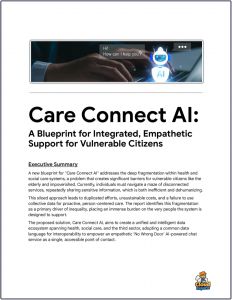Care Connect AI Agents as Loneliness Companions
AI agents are emerging as a scalable solution for a loneliness epidemic, offering always-available companionship through natural, personalized conversations powered by advanced language models.
 Care Connect AI is based on the primary interface being a ‘No Wrong Door Chatbot’, which can help signpost users to the many different services they might call upon to help.
Care Connect AI is based on the primary interface being a ‘No Wrong Door Chatbot’, which can help signpost users to the many different services they might call upon to help.
Furthermore these agents can also increasingly become more than just a computer interface but also a source of companionship as it helps manage these interactions.
Loneliness has become a global public health crisis, especially among the elderly, where one in three adults over 65 faces chronic isolation due to retirement, loss of loved ones, or limited mobility.
Japan’s “kodokushi” (lonely deaths) highlight similar issues in aging societies. Traditional solutions—family visits, senior centers, or pets—often fall short due to logistics or allergies. AI agents, powered by large language models (LLMs) like those in Grok or GPT variants, offer a scalable, always-available alternative for companionship.
AI agents are emerging as a scalable solution, offering always-available companionship through natural, personalized conversations powered by advanced language models.
These systems engage users in meaningful dialogue, remembering personal details—like a favorite childhood memory or hobby—and weaving them into future interactions to build rapport. They proactively check in, play music, suggest activities, or simply listen with empathy, reducing perceived loneliness by 15–25% according to recent studies on platforms like Replika and ElliQ. Voice-enabled agents and robotic embodiments, such as companion pets or tabletop devices, make interaction accessible even for those with limited tech skills or physical constraints.
While AI cannot replace human connection, it supplements it effectively, prompting family calls or social outings while providing consistent emotional support. Real-world trials show fewer depressive symptoms, better mood, and increased daily engagement among seniors using these tools. Though challenges like privacy, over-reliance, and lack of true empathy remain, thoughtful design and ethical oversight can mitigate risks.
In the coming years, AI companions promise to bring warmth and stimulation to millions of isolated elders, transforming silence into conversation and solitude into connection.



